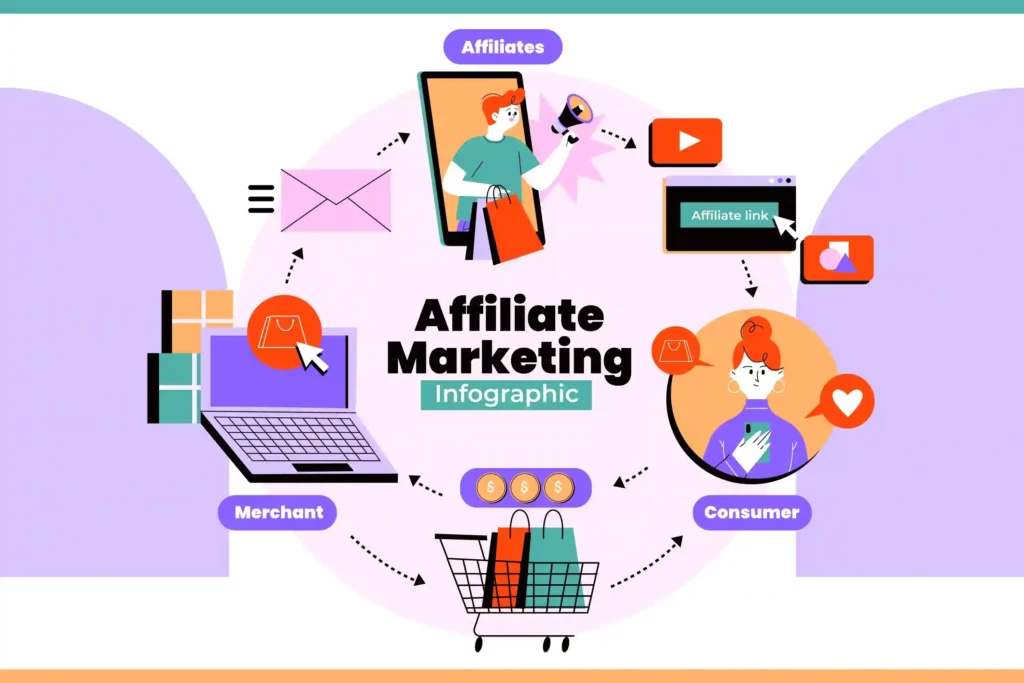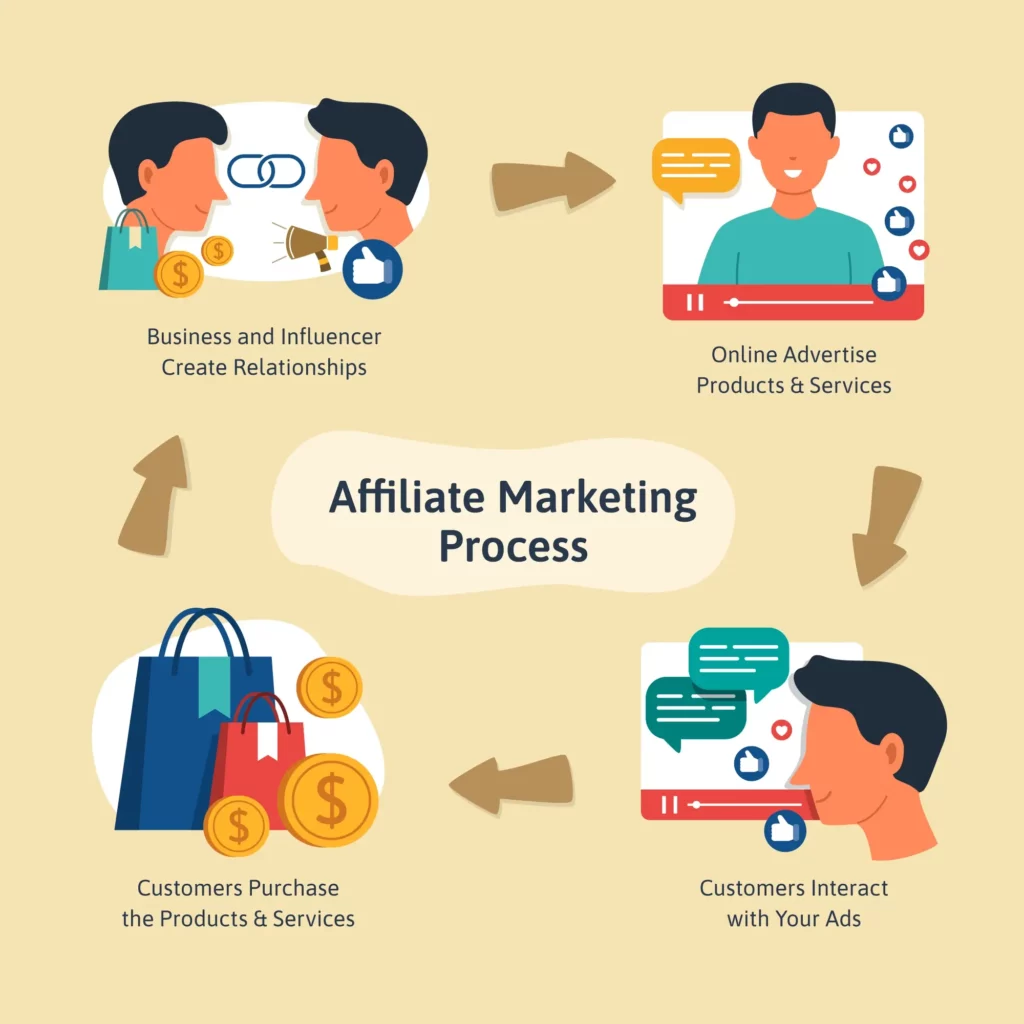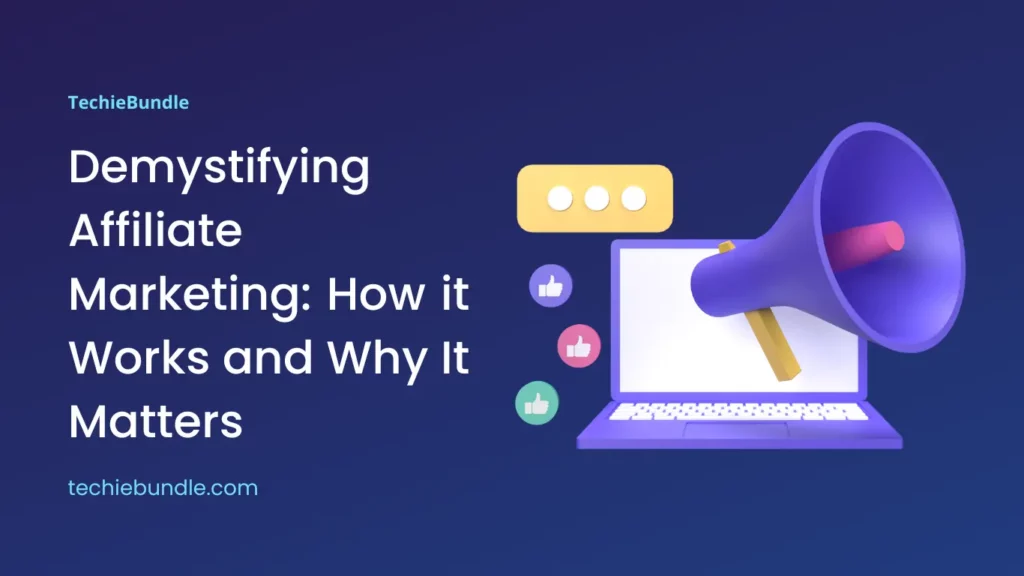Introduction
In the digital age, where online commerce is thriving, businesses are constantly exploring innovative ways to reach their target audience and boost sales. One such strategy that has gained immense popularity is affiliate marketing. This powerful and cost-effective approach has become a cornerstone for many successful e-commerce ventures.
In this article, we’ll delve into the world of affiliate marketing, unraveling its intricacies and exploring how it works.
What is Affiliate Marketing?

Affiliate marketing is when you promote and sell other people’s products or services and get paid for them. Even though it sounds simple, there are many steps to it. You make money by selling things that belong to someone else.
Essentially, it involves a partnership between a business (the merchant or advertiser) and individuals or other businesses (affiliates or publishers) who promote the merchant’s products or services and earn a commission for driving desired actions, such as clicks, leads, or sales.
Here’s a breakdown of the key components:
- Merchant/Advertiser: The company or business that owns the product or service and wants to increase its sales or online presence through affiliate marketing.
- Affiliate/Publisher: An individual or entity that promotes the merchant’s products or services in exchange for a commission.
- Affiliate Network: In some cases, there is an intermediary called an affiliate network that connects merchants with affiliates. The network helps manage the affiliate program, track conversions, and handle payments.
- Commission/Payment: Affiliates earn a commission for each desired action generated through their marketing efforts. The payment structure varies and can be based on clicks, leads, or sales.
Example of Affiliate Marketing:
Let’s say Company X sells fitness equipment and wants to increase its online sales. Company X sets up an affiliate program and offers a 30% commission on every sale generated through affiliate links. John, a fitness blogger, joins the affiliate program.
Here’s how the process works:
- John Signs Up: John registers for Company X’s affiliate program and receives a unique affiliate link.
- John Promotes the Products: John writes blog posts, creates videos, and shares social media posts promoting Company X’s fitness equipment, including his affiliate link.
- Customer Clicks on the Affiliate Link: Sarah, a reader of John’s blog, clicks on the affiliate link, which directs her to Company X’s website.
- Customer Makes a Purchase: Sarah browses Company X’s website and decides to buy a set of dumbbells. The purchase is tracked back to John’s affiliate link.
- John Earns a Commission: Company X acknowledges that the sale came from John’s referral and pays him a 30% commission on the sale amount.
In this example, affiliate marketing benefits both Company X and John. Company X gains more sales without upfront advertising costs, and John earns a commission for promoting products he believes in.
How Does Affiliate Marketing Work?

- Parties Involved:
- Merchant (Advertiser): This is the business that owns the product or service. The merchant sets up an affiliate program to allow others to promote their offerings.
- Affiliate (Publisher): Affiliates are individuals or entities that sign up for the merchant’s affiliate program. They promote the merchant’s products or services and earn a commission for each successful sale or action.
- Consumer (Customer): The end-user who clicks on the affiliate’s link, engages with the merchant’s product or service and potentially makes a purchase.
- The Affiliate Link:
- Affiliates are provided with unique tracking links or affiliate links by the merchant. These links enable the merchant to identify which affiliate is responsible for driving traffic or generating sales.
- Promotion and Content Creation:
- Affiliates use various channels to promote the merchant’s products, such as websites, blogs, social media, email marketing, or YouTube channels. They create compelling content to attract their audience and encourage them to click on the affiliate links.
- Driving Traffic:
- Affiliates aim to drive targeted traffic to the business’s website using their affiliate links. This traffic may come in the form of clicks, leads, or actual sales, depending on the agreement between the business and the affiliate.
- Tracking and Analytics:
- The affiliate link contains a unique identifier, allowing the merchant to track the source of the traffic and monitor the performance of each affiliate. Advanced analytics help merchants evaluate the success of their affiliate marketing campaign.
- Earning Commissions:
- Affiliates earn commissions based on the agreed-upon compensation model. Common models include:
- Pay-Per-Sale (PPS): Affiliates earn a percentage of the sale amount for each customer they refer.
- Pay-Per-Click (PPC): Affiliates earn a fee based on the number of clicks generated through their affiliate link.
- Pay-Per-Lead (PPL): Affiliates earn a commission for each lead they generate, such as a sign-up or trial.
- Affiliates earn commissions based on the agreed-upon compensation model. Common models include:
- Payment Process:
- Once a customer purchases through the affiliate link, the affiliate is credited with a commission. Payments are typically made on a regular schedule, such as monthly, through methods like bank transfers, checks, or digital payment platforms.
Why Affiliate Marketing Matters

- Cost-Effective:
- For merchants, affiliate marketing is a cost-effective advertising strategy. They only pay for actual sales or desired actions, making it a low-risk investment.
- Scalability:
- Affiliate marketing allows businesses to scale their reach quickly by leveraging the audience and expertise of affiliates.
- Diversified Marketing Channels:
- Affiliates use various platforms and channels to promote products, providing businesses with diversified marketing efforts.
- Performance-Based:
- The performance-based nature of affiliate marketing aligns the interests of both merchants and affiliates. Success is directly tied to results.
Types of Affiliate Marketing Channels
Affiliate marketers get visitors and sales in many ways. Some ways are more common than others. You can also use our tool to guess how much money you might make each day, month, and year. This guess is based on how many people visit your site from any source and how many of them buy something.
Here are some of the favorite marketing channels to succeed with affiliate marketing:
Blogging
Blogging helps people who do affiliate marketing show up in search results for free. This brings more people to their affiliate products. Bloggers often write reviews, how-to articles, and educational posts about the product they are promoting. They include a special link to the product seller’s site in their posts. When someone buys through this link, the blogger earns money from the sale.
Influencer Marketing
Influencer marketing platforms make it easier and more effective to use influencer marketing strategies. At Influencer Marketing Hub, we like influencer marketing. Influencers are people who have a big influence on others, especially on social media like Instagram, YouTube, and Facebook. People follow these influencers because they like what they share and say. This means they are more likely to try out things the influencer suggests or promotes.
Influencer marketing for affiliate sales can take many different forms like live videos, product reviews, account takeovers, and more.
Paid Search Microsites
Microsites are small, branded websites or just one webpage that is different from your main website. They give you another way to share detailed information and promote affiliate products. Since they’re not part of your main site, you can give a clearer, more specific message without the distractions you might find on a regular website.
Email Marketing
Email marketing is very effective and can bring in a lot of money. For every $1 you spend on email marketing, you could earn back $35 to $44. This makes it a great tool for making money.
If you’re into affiliate marketing, your email list is a key way to make sales. It’s important not to always try to sell things in every email. A good balance is to send one email trying to sell something for every three emails that give useful information or help to your readers. You can put affiliate links in your newsletters and see your sales grow.
Coupon Sites
Coupon websites are now a big part of affiliate marketing because more people are shopping online. If you put your affiliate links on these sites, you can get a lot of sales from shoppers looking for good deals.
Mass Media Sites
Big media websites aim to get lots of people to visit them. They often have reviews and comparisons of different products, and many of these products are part of affiliate marketing. These websites help show that people like and trust the products listed. They usually advertise products using banners and links that fit into the articles.
Tips for Successful Affiliate Marketing
Successful affiliate marketing requires a strategic approach, combining patience, persistence, and smart tactics. Here are some tips to help you succeed:
- Choose the Right Affiliates: Select products and companies that align with your audience’s interests. Promoting products you believe in increases credibility and conversion rates.
- Understand Your Audience: Know what your audience needs and desires. Prepare your content and affiliate offerings to match their interests to ensure better engagement and sales.
- Provide Valuable Content: Instead of solely focusing on sales, create useful and informative content that helps solve problems or answers questions. This can include reviews, tutorials, and how-to guides.
- Use Multiple Channels: Don’t rely on a single platform for promotion. Utilize your website, social media, email newsletters, and other digital platforms to reach a broader audience.
- Track and Analyze Performance: Use analytics tools to monitor your affiliate campaigns’ performance. Understanding what works and what doesn’t allows you to make informed adjustments.
- Build Trust with Your Audience: Honesty and transparency about your affiliate relationships can build trust with your followers. Disclose your affiliate links and explain how they support your content.
- Optimize for SEO: Enhance your content for search engines to improve visibility. Use relevant keywords, meta descriptions, and quality content to rank higher in search results.
- Stay Current on Trends: Affiliate marketing and digital trends evolve rapidly. Keep up-to-date with industry news and adjust your strategies accordingly.
- Be Patient: Affiliate marketing success doesn’t happen overnight. It requires time to build content, audience trust, and a steady flow of traffic.
- Experiment and Learn: Be open to trying new strategies, tools, and products. Learning from both successes and failures is key to growing your affiliate marketing business.
By following these tips, you can increase your chances of running a successful affiliate marketing program. Remember, consistency and quality are essential in building a long-term, profitable affiliate marketing strategy.
Conclusion
Affiliate marketing is a dynamic and mutually beneficial collaboration between merchants and affiliates. As e-commerce continues to evolve, the role of affiliate marketing in driving sales and expanding brand reach is more crucial than ever. Whether you are a business looking to boost sales or an individual seeking opportunities in the digital space, understanding the mechanics of affiliate marketing, especially within the context of the top 5 high ticket affiliate marketing programs, can open doors to a world of possibilities.
Frequently Asked Questions about Affiliate Marketing
Q1. Can Affiliate Marketing Be a Full-Time Career?
Yes, many people have successfully turned affiliate marketing into a full-time career. However, it requires dedication, strategic planning, and time to build a substantial income. Initially, it may start as a supplemental income source, but with growth and effective strategies, it can certainly become a full-time career.
Q2. How Much Money Can I Make from Affiliate Marketing?
The earning potential in affiliate marketing varies widely. It depends on factors like the niche you choose, the effectiveness of your marketing strategies, and the amount of time and effort you invest. Some affiliates earn a few hundred dollars a month, while others make six-figure incomes.
Q3. Do I Need a Website for Affiliate Marketing?
While having a website can be beneficial for affiliate marketing, it’s not strictly necessary. Many affiliates successfully use social media platforms, YouTube channels, or email marketing to promote products. However, a website can provide a more controlled and professional platform for your content and promotions.
Q4. How Do I Choose the Right Affiliate Products to Promote?
Choose products that align with your niche and are relevant to your audience. Consider the quality of the product, the reputation of the merchant, and the commission structure. It’s also important to promote products that you trust and believe in, as this will be more convincing to your audience.
Q5. Is Affiliate Marketing Still Profitable in 2023?
Absolutely, affiliate marketing continues to be a profitable venture. With the ongoing growth of online shopping and digital marketing, the opportunities in affiliate marketing are expanding. Staying updated with the latest trends and adapting your strategies accordingly are key to maintaining profitability.
Q6. How Long Does It Take to Earn Money from Affiliate Marketing?
The time it takes to start earning money from affiliate marketing can vary. Some affiliates see earnings within a few months, while others may take longer. Success in affiliate marketing often requires patience, consistent effort, and strategic adaptations based on performance and market trends.
Q7. How Can I Drive Traffic to My Affiliate Links?
Driving traffic to your affiliate links can be achieved through various strategies such as search engine optimization (SEO), content marketing, social media marketing, email campaigns, and pay-per-click advertising. Understanding your audience and choosing the right channels and strategies to reach them is crucial.
Q8. What are the Common Pitfalls in Affiliate Marketing?
Common pitfalls include promoting too many products, neglecting to disclose affiliate relationships, focusing solely on sales rather than valuable content, and failing to stay updated with market trends and affiliate program changes. Avoiding these pitfalls requires a balanced approach and a focus on building long-term relationships with your audience.



